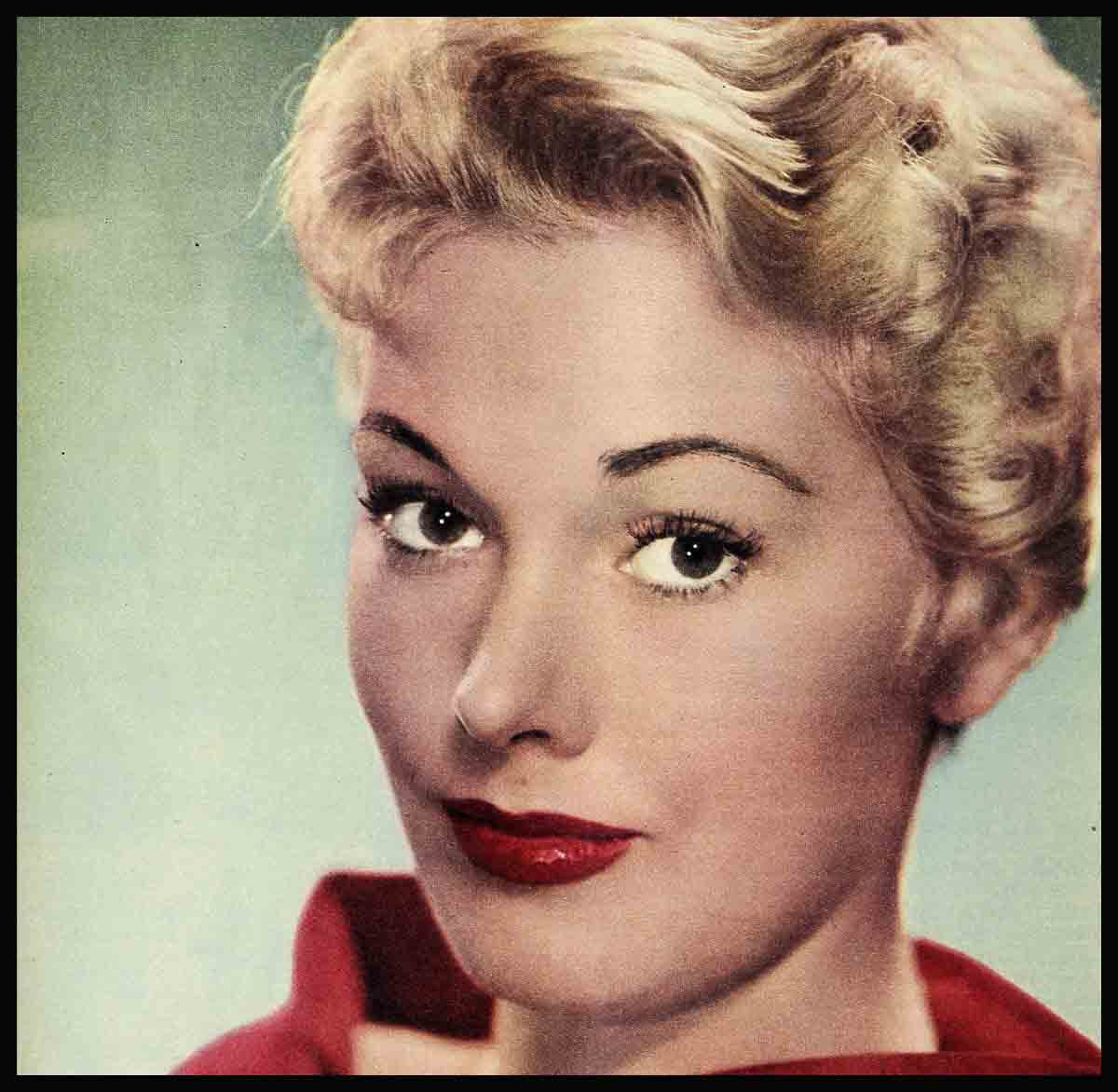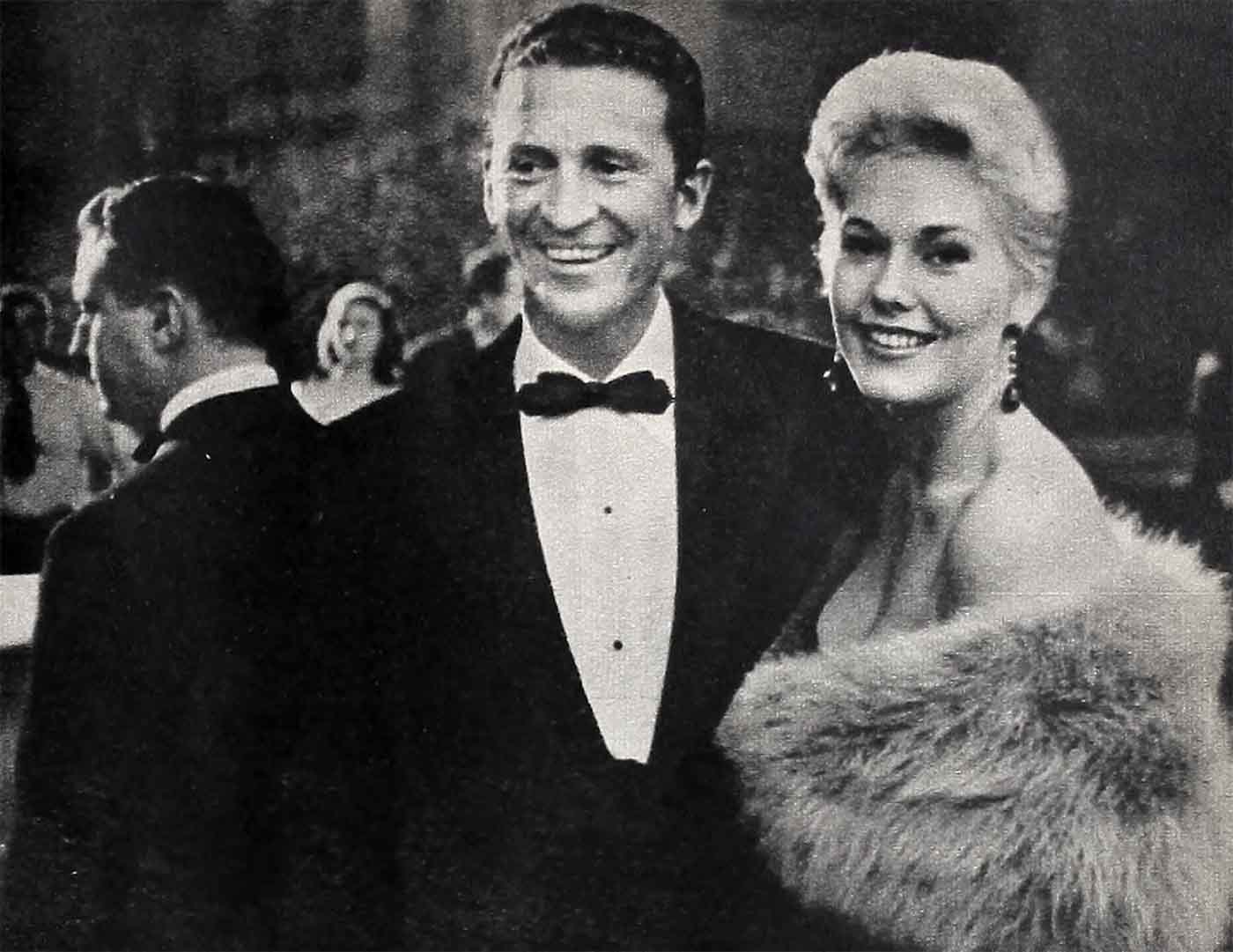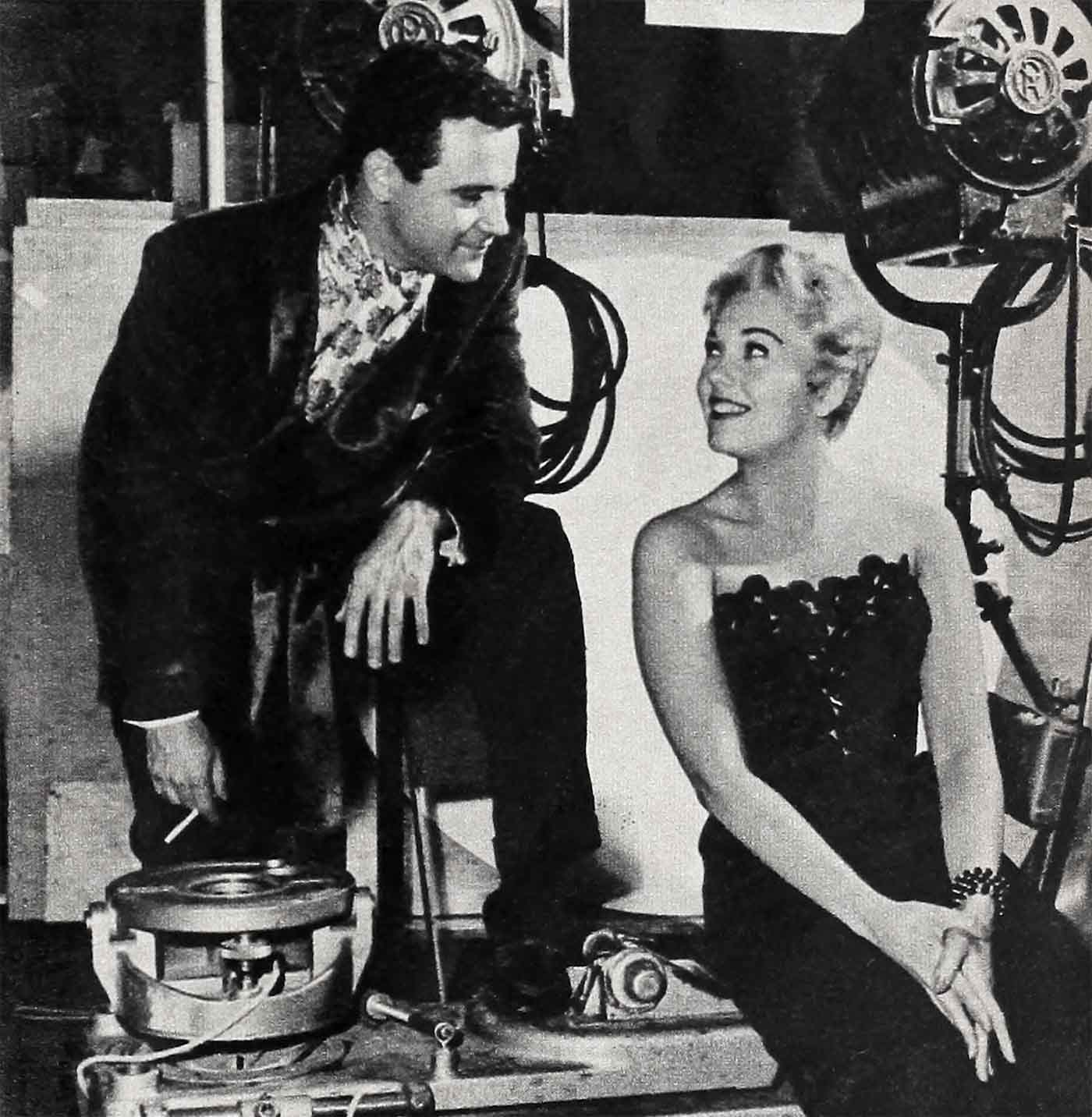
How To Be Good And Popular—Kim Novak
“It wasn’t until I was in the eighth grade,” Kim Novak said, “that a boy—any boy, mind you—spoke to me.
“Up until then I had been in absolute despair. I was at that age when boys began to be important. My name was Marilyn Novak and I had added Ann as a middle name. I didn’t dare explain why, but I knew the dark romantic reason.
“That was so that I could write those three letters down on my school papers. M. A. N. If anybody asked why, I could just innocently say that I was merely writing my initials.
“But that wasn’t the truth. Those letters were a kind of prayer—M. A. N.—meaning, ‘Please let me be popular.’ Which, as every young girl knows, means ‘Please let me be popular with boys.’
“I wasn’t; I wasn’t popular with girls, either. Some girls manage that when boys don’t notice them, but it wasn’t true with me. The other girls in my school class snubbed me. They whispered among themselves when I came into the room and giggled.
“I just about died every time this happened, and I blamed it on my mother. Now I know I was dead wrong. My parents had been born in this country, just as I was, but Mother still carried over a lot of old-fashioned European notions about how a nice girl was brought up.
“One was that a nice girl, just in her teens, didn’t wear make-up, too casual clothes or a trick hair-do. At thirteen I was too tall for my age and very skinny in a group of girls who were all very developed. What’s more, my grandmother made my clothes. They were beautiful clothes, I now realize, but at thirteen I was only conscious that they weren’t ‘store bought’ like the other girls’ and ‘store bought’ was what I wanted—and the flashier the better.
“Today I’d be the last to deny the appeal of the right hair-do, the right make-up or the right dress for eye appeal. They are great. They are your card of introduction to the world, in a way, yet they aren’t what make you popular.
“That’s what I found out, that miraculous day, when a high-school boy stopped me in the hall, between classes, and spoke to me.

“A high school boy, mind you. Two years and two grades ahead of me, at the time of a girl’s life when two years and two grades are so terribly, terribly important. There was a school picnic about to be held. I’d never before been asked to one. But this boy—a big man in his class in every way—said to me, ‘You’d be fun to be with, Marilyn. So you be sure and come to the picnic. I’ll save a place for you.’
“I was too overwhelmed to even speak. I just nodded agreement. He grinned at me, went on to his class. But as I stood there, practically overcome, a couple of girls who had always given me the iciest snubs, swarmed over to me. ‘Oh, Marilyn, they cooed, sweeter than a double chocolate eclair with syrup and whipped cream, ‘Oh, Marilyn, you must come with our crowd to the picnic. We were just going to ask you to join us, when Bill did.’
“That was my first lesson in popularity, and I didn’t like it, and I still don’t. I didn’t dare figure out why that boy had picked me out. I was afraid to think about it, for fear the miracle of it would vanish. But I saw through those girls as easily as looking through an open window. I was still Marilyn Novak, wearing my hair in tight French braids, wearing a high-necked, long-sleeved dress my grand- mother had made, not owning a lipstick. But those girls now wanted me because a popular boy had put the seal of approval on me. Suddenly I was worth knowing, not because of anything I’d thought or said or done but entirely for an external reason.”
Kim Novak, the girl who is generally conceded to be the fastest-rising young actress in Hollywood today, leaned back on the booth in the quiet restaurant. She’s a real doll, this beauty, sensitive, intelligent, charming.
At this particular moment her extraordinary green eyes, under her fluff of white-gold hair, looked a little hurt in remembrance. She had the merest trace of lipstick on her mouth, no powder on her face and the dress she wore could not have been simpler—or more effective, as was prone by the number of gentlemen who kept finding excuses for going by our table and giving her long glances.
Kim took this attention demurely, her eyes downcast, but she looked up, smiling ruefully, when the men had passed. “See?” she said. “That’s the same kind of popularity, nine years later. Those men are not interested in me, as me. They are interested in the girl who now is called Kim Novak, and who has made a couple of movies which, fortunately, people liked.

“Don’t misunderstand me. I like being recognized, and it’s a big thrill, being a celebrity, even junior grade, the way I am. But I think the very first thing a girl must learn, particularly while she is still in her teens, is what’s the why of popularity and what’s the why of un popularity and see what she should do about either situation.
“For instance, a girl must decide just how far she can go in adapting herself to other people’s rules without losing her own individuality. Learning to go with some of the rules is part of popularity certainly.
“Take me. I was one of those shy kids. When I was really little, pre-school age, that is, I was so afraid of everyone that I’d hide behind our living-room curtains or, if strangers came in too quickly to make that possible, I’d hide behind my mother’s skirts.
“I had a grown-up male cousin who didn’t mean to be cruel, I’m sure, but he actually was. He’d come to our house, hunt all over for me, move the couches and chairs, if need be, and finally drag me from my hiding place. He’d bring me forth before the company and say, ‘Tell me. Is this a boy or a girl?’
“I wasn’t even in my teens, the first time I fell in love. The boy never knew it, because I didn’t dare speak to him, and he didn’t know I even existed. But I found out where he lived, and I went over to that section of Chicago, and then I saw is name written on the sidewalk I felt it was a mystic sign to me. I’d picked some flowers on the way over, from a garden I’d passed. I went up to the door nearest the sidewalk where his name was written and I left the flowers, a pure act of devotion on my part. Of course, since it was just his first name that was written there, it may well have been six other boys of the same name. But I didn’t think of that then.
“I did crazy things like that, and never talked about them because at that time I just couldn’t put anything into words. I was too shy.
“My mother believed every child should have music lessons, so I had some, both piano and voice. My teacher liked me, but her mother thought I was just terrible. She’d sit in the room while I took my lessons and shake her head, saying, ‘Tch, tch,’ under her breath all the time in disapproval. A couple of months ago, when I was making ‘Phffft,’ I looked up and saw
the cameraman watching me, shaking his head and saying, ‘Tch, tch.’ Suddenly, without warning, I began to cry. I didn’t want to. The cameraman asked me what was the matter, and I was almost too embarrassed to explain. When I did, he laughed, and said he hadn’t been shaking his head at me, but over one of the lights and the way it was shadowing the scene incorrectly.

“When a girl is naturally shy, it takes her a long time to realize that other people are shy, too, and that not everybody wants to hurt you. But if to cover your shyness you go to the other extreme and act loud and show-offy just to hide this, you will appear to be a phony. In fact, you are a phony.
“This is what I mean by protecting your own individuality and yet adapting it to certain rules.” Kim paused again.
“There must be so many young girls as bewildered as I was,” she went on. “I never actually wanted to do anything that was false and I think this kind of idealism is common to many teenagers. I loathed the polite lies that make you say someone’s hat is pretty when you don’t think it is actually. But on the other hand, I certainly didn’t know how to make a graceful compliment of any sort. That’s why, today, I try paying at least one compliment a day to someone—a definite task to myself—that is when I feel it is deserved.
“There’s a very fine line, as every girl knows, between sincerity and insincerity. But I think we also have to realize that some of our so-called sincerity is sometimes selfishness or even an unrecognized jealousy. Maybe you don’t think another girl’s dress is becoming to her just because you are jealous that she has a new one while you are wearing your last year’s. Or maybe when your date comes calling for you he is wearing a sports shirt, let’s say, that to your taste is perfectly terrible. But are you sure, when you tell him it’s awful that you aren’t, maybe, just ‘trying to take him down’? Or, in other words, ‘trying to put yourself up’?
“I’ve found out a most wonderful thing about paying compliments,” Kim said. “I’ll confess that originally I began it to make boys like me better. I never did quite lie and I still don’t and, of course, now I don’t limit the compliments to boys exclusively. But, in my early teens, if my date was wearing something outlandish or took me somewhere outlandish, I wouldn’t say it was just too, too adorable, because that was a lie.
“Lots of people think that when you lie it shows in your face, and often it does. But I think one thing is always positive: when you lie, it sounds in your voice. Haven’t you often had somebody tell you something and you didn’t know why, but you knew it wasn’t true? That’s the sound that comes in your voice, when you know what you are saying is false.
“But there is always something about everybody on which you can compliment him. Maybe the only very nice thing you can say about your date, for instance, is that he has big, strong hands. So, say that. Or maybe he is more considerate than anybody else you know, or more punctual, or more something. One of the great, great. things about people is that every single human being has his or her own distinction. Search out that distinction in your friends and compliment them on it. You’re not being insincere when you do that. In fact you are being thoughtful and what really seems so tremendous, to me, at least, is that with compliments, as with everything else, in turns out to be more blessed to give than to receive.”
Kim shook her pretty young head thoughtfully. “As a fairly normal girl growing up,” she said, “I just never could quite accept that statement even though it was from the Bible. I’d go to church and hear it and I knew I was the one at fault for not accepting it, but I’d sit there thinking, it is so much more wonderful to get presents.
“Yet, oddly and wonderfully, it was through learning to pay compliments that I discovered that it was more blessed to give, more blessed to you, I mean. Because when you do search out the nice thing about a boy or a girl or a relative or whomever and do compliment him on it, you feel the most terrific glow. He is made happy—but you are made happier and, in some way I can’t quite understand, he becomes nicer to you, in your own mind.
“And, of course, you are much more popular with them from that point on. So that is one way that anybody can be good, kind and truthful and yet become very, very popular.
“And another thing is that while you are spending time thinking about how to say an accurate, original and nice thing about somebody else, you are forgetting yourself, your shyness and your self-consciousness. So you conquer that without knowing it.
“I remember,” Kim said, “that one of the first boys I ever dated told me he had noticed me because I had such good posture. Now, my posture was due to my mother always making me and my sister sit up straight and ‘walk tall.’ I had done that simply because I had to, but that boy made me so happy telling me that my posture gave me distinctiveness that I promptly fell in love with him.
“I was always falling in love, anyhow. Before I was nineteen and had been discovered, I had fallen in love seventeen times, and fallen out seventeen times also.
“Which brings us around to the problems of dating.” Kim gave a long serious look. (You can’t be with this girl five minutes before you realize it wasn’t merely her face and her figure, that got her “discovered.” Nor was it merely good looks that made her score so definitely in “Pushover” and “Phffft.” In one she played a cheap girl and the other a very dumb one and did them both superbly. Kim is that rare blend, a beautiful and sexy girl who has brains and sensitivity, too.)
“A fellow re-dates a girl because she’s fun to be with,” Kim went on to explain. “And a girl should remember this. Popularity doesn’t depend upon sitting in a parked car.”
“Which is why you live in Hollywood at the Studio Club for girls only?” I said.
“Partly,” said Kim. “Partly I live at the Club because I’m still scared of the dark and Id be afraid to be alone at night in my own apartment if I had one. And partly I like living in a Club where things are easily taken care of, since I’m so busy, not alone with my work, but with acting classes four nights a week, diction classes two nights a week, singing lessons every day, dancing lessons every other day.
“Right now, for a year or so at least, I’ll be too busy to fall truly in love. I do want to, though, to marry and have children.
“Now, any man who dates me from the Studio Club knows I’ll meet him at the door, and say good night to him there—and that’s that. But from my angle, I know he knows that, too, so I know he’s not a wolf—but a very nice human being. See?”
Kim stood up, and every eye in the restaurant focused on her, her sensitive, flowerlike face, her lovely figure. What I saw was that she is very, very good and very, very popular.
THE END
It is a quote. PHOTOPLAY MAGAZINE AUGUST 1955




